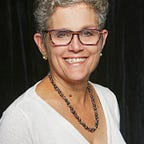This is My Brain on Spanish: Learning Language as an Adult
I am sitting in a nail salon in Oaxaca. Carmen, the young manicurist sporting a black t-shirt with a white skull and the words “NEW YORK NEW YORK”, smiles at me hopefully. This, I think, is the test of my Spanish learning so far: nail salon chit-chat. I’m not that good at it in English and for some reason, the thought of it is more anxiety-producing than conjugating verbs. How do I make small talk with a twenty-year old in Spanish? “Just go for it,” I think to myself, “it’s not an exam.” And soon enough, Carmen and I are chatting about our families, our work and gel colors. I learn the words for cuticle (cutícula) and “take your hands out when it beeps” (saque los manos cuando suene).
I’ve just completed Week 2 of a three-week immersion at the Instituto Cultural Oaxaca. Oaxaca is full Americans — many retired, many studying Spanish, many artists, some spending weeks and months and returning annually. The ICO is housed in a leafy school compound with the feel of a colonial hacienda, framed by shaded patios and abundant tropical plants.
If learning new things is a way to stave off senility, if nothing else, I will keep my marbles for a while longer. In…
